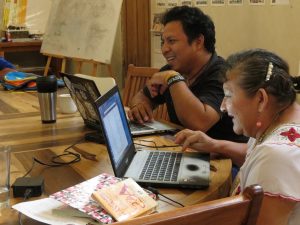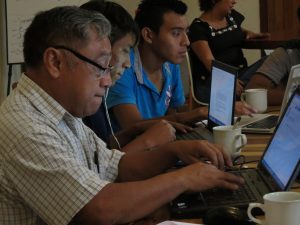Mapping project of Wikipedia in indigenous languages

Wikipedia in Maya Yucateco workshop held in Merida, Mexico by Luis Alvaz. Photo licensed under the Creative Commons Attribution-Share Alike 4.0 International license.
Written by Eddie Avila, Director of Rising Voices. He has also worked as Regional Editor and Spanish Language Editor for Global Voices, as well as a volunteer author for Bolivia.
When we discuss working towards achieving diversity in Latin America, we can find many of the same challenges facing similar communities around the world: LGBT, people with disabilities, and those from lower socio-economic sectors of society, just to name a few.
However, in some countries in Latin America where there are larger numbers of indigenous populations such as in Guatemala, Mexico, Bolivia, Peru, and Ecuador, the roots of exclusion can be traced back for centuries and the effects can still be seen. These communities continue to face marginalization and a lack of equal opportunity across these societies. While there are hopes that the internet can be a space to provide a more level playing field, barriers still exist that prevent full participation in the creation and sharing of knowledge both offline and online.
It is in that context that I took part in the recent Wikimedia Diversity Conference in Stockholm, Sweden thanks to the support of Wikimedia Norway.
Rising Voices’ recent experience with a research mapping project of Wikipedia in indigenous languages helped take a closer look at these challenges and opportunities for the sharing of knowledge by these communities in their native languages. There are 37 Wikipedia projects currently available in indigenous languages (4 official and 33 incubator), and although it may appear on the surface that indigenous communities are actively involved in sharing knowledge in their own language, a closer look reveals another reality. Based on the data that we collected and the interviews conducted, we believe that none of the sites in these languages were started by native speakers. In addition, it is difficult to know to what degree the communities took part in the decision-making process to start a project, but it appears to be little to none.
As outlined in my lightning talk shared on the 2nd day of the Diversity Conference, the research mapping team compiled recommendations for supporting communities interested in building and sustaining Wikipedia in their language, which could be generalized in the following three recommendations:
- Projects should come from the community – native speakers from these communities must be involved from the beginning to determine whether or not a free encyclopedia in their language is a priority.
- Projects should be led by the community – native speakers in leadership roles also must be made a priority, where they will be actively involved in all decision-making processes.
- Projects should be supported within the community – there is an opportunity for the wider Wikimedia movement to be actively involved in accompanying the creation and sustaining of these projects providing assistance in technical matters and integration into the movement.
While we know that there are similar initiatives across the Wikimedia movement promoting Wikipedia in smaller or minority languages, we purposefully focused only on Latin America. Of each of the 37 sites we examined, each has its own unique context, opportunities, and challenges, but we attempted to find trends or commonalities among the indigenous languages. We hope that these overarching themes can be applied to most other Wikipedia projects in these underrepresented languages.
For example, during the Diversity Conference, I had a conversation with Astrid from Wikimedia Norway, who shared similar challenges in their affiliate’s work with the Wikipedia Northern Sami project in attracting more native speakers to contribute. While it was difficult for me to provide specific recommendations due to my unfamiliarity with this part of the world and the unique context of Northern Sami speakers, I think that much of the overarching recommendations can apply here too in regards to incorporating native speakers into these projects.

Wikipedia in Maya Yucateco workshop held in Merida, Mexico by Luis Alvaz. Photo licensed under the Creative Commons Attribution-Share Alike 4.0 International license.
The Wikimedia affiliate system provides an accessible network of support for members of indigenous communities with curiosity about Wikipedia. Teaching and providing mentorship to these communities about the basics of editing, as well as the overarching pillars of Wikipedia can help make the barrier to entry easier to navigate without having to learn to master the more complicated incubator platform. Providing opportunities to integrate into the Wikimedia movement taking part in events and community-building can help set the foundation for future projects in smaller languages.
While our research focused on the diversity of languages in Wikipedia, other questions arose during this process related to the diversity of knowledge found on the platform. It was no surprise to learn that indigenous languages in Latin America have primarily been oral in tradition. Challenges with the written form of the language was a major obstacle, raising the question about alternatives for sharing knowledge in oral formats.
We found a wide variety of articles in these native language Wikipedias, everything from universal knowledge to articles about pop culture, but some sites saw Wikipedia as a place to share knowledge specific to that culture. This might include information about traditional medicinal plants to worldview stories passed down from generation to generation. Questions about the compatibility of this type of knowledge with the type of open licenses in which Wikipedia is made available didn’t arise during the mapping project, but it has been presented following the release of the results.
Spaces like the Wikimedia Diversity Conference provided a space to ask these questions regarding the diversity of knowledge within the Wikimedia movement, as well as the diversity of communities participating. It also served as a meeting ground for people within the movement to make connections to continue to share and exchange experiences for future collaborations.
Wikimedia’s motto: «Imagine a world in which every single human being can freely share in the sum of all knowledge. That’s our commitment» in eleven languages of Mexico, by Wikimedia Mexico.
Kategori: Blogg, Innlegg forside, Internasjonalt, Mangfold på Wikipedia, Nordsamisk Wikipedia, Northern Sami Wikipedia, Nyheter, Wikimedia Diversity Conference
Stikkord: diversity, mangfold